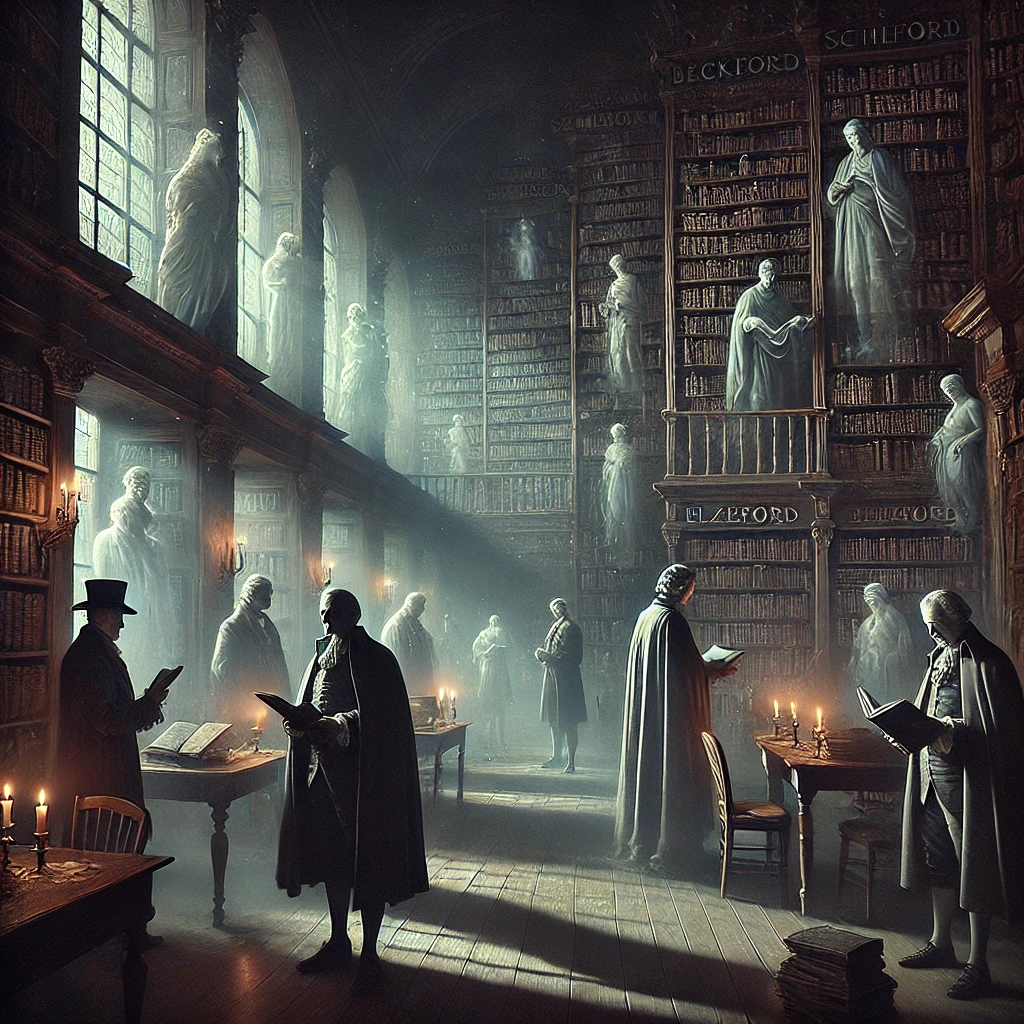Ghosts in the Library
byGhosts in the Library is a haunting yet poetic vision of how the spirits of those who once cherished books now inhabit the very shelves that hold their literary treasures. As the world drifts into slumber, the library itself comes alive with echoes from the past. The spirits of former patrons, ranging from revered historical figures to the lesser-known, move silently through the aisles, drawn to the very texts that once captivated them. Napoleon, the French emperor whose ambitions shaped European history, is seen silently retrieving a controversial pamphlet—an enigmatic work once hidden in the shadows of Frankfort. This pamphlet, brimming with scandalous tales tied to Molière’s legacy, is a relic of a time long past, yet it still stirs something within Napoleon, pulling him into the space where his intellectual passions once lay.
Meanwhile, Sir Walter Scott, another towering figure in literary history, searches the shelves for works that reflect his own life’s work—tales filled with the grandeur of his beloved Borders. His presence, marked by a reverence for both poetry and history, blends seamlessly with the atmosphere of the library, where the stories of the past continue to live on through the pages of the books. The connection between Scott and the volumes he seeks is palpable, as his fingers lightly trace the spines, recalling the poetic power of Benvoirlich and the historical depth of the Buccleuchs. This spectral meeting of the minds, where historical figures from different eras converge, provides a glimpse into the transcendent power of books and how they bridge generations. Their eternal connection to the literary works they once treasured is now manifest in this ethereal gathering, where the pursuit of knowledge and literary legacy is celebrated long after their physical forms have vanished.
The presence of other historical figures deepens the connection between the ghosts and the written word. A duke, seemingly lost in time, seeks the rare and precious Elzevir volumes, while Beckford, renowned for his taste in luxurious bindings, yearns for his cherished books bound in moroccan blue. Even de Thou, a dignified figure in the realm of history, mingles among the literary greats, sharing space with scholars, philosophers, and statesmen alike. The ghosts of Gambetta, Schlegel, and Drummond emerge in this quiet gathering, each one silently seeking the texts that once spoke to their intellects, weaving a tapestry of individuals whose contributions to literature and politics shaped the world as we know it. Their haunting presence in the library stands as a testament to the enduring impact of books, with each spirit seeking the very works that helped shape their intellectual journeys. As these figures from history come together in the spectral world of the library, they form a timeless connection that transcends the boundaries of life and death.
Yet, amidst these towering figures, there are countless unnamed ghosts, the forgotten “Smiths” and “Thompsons,” whose fleeting presence leaves only the faintest of marks on the fly-leaves of time. Their contributions may have been lost to history, their names never inscribed in the annals of fame, but their spirits are no less significant. They are reminders of the impermanence of memory and the many stories that, though now forgotten, once shaped the world around them. These lesser-known figures, their presence barely perceptible, add an essential layer to the idea of literary legacy—the countless lives, some brief and obscure, that have been touched and shaped by the power of books. These ghosts, though forgotten, contribute to the greater tapestry of history, reminding us that every book holds the traces of countless hands, minds, and spirits that have passed through its pages.
In the quiet corridors of the library, these spectral encounters form a profound narrative of how literature binds together the ethereal and the tangible. It serves as a bridge between the past and the present, between the lives of those who have come before and those who continue to walk among the living. The library, in its silence and grandeur, is not just a collection of books, but a hallowed space where the spirits of bookmen—both renowned and obscure—continue to live on. It is here, in the realm of ink and paper, where the stories of the past are forever enshrined, and where the ghosts of history continue to revisit the pages they once cherished. The enduring power of the written word is made clear as these spirits gather, making their presence felt in the very books that continue to captivate new generations of readers.


